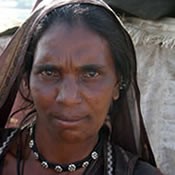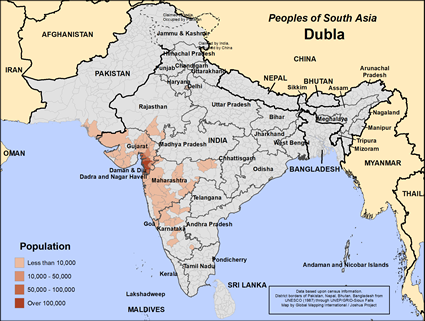Dubla in Pakistan

Photo Source:
Copyrighted © 2026
Anonymous All rights reserved. Used with permission |

Map Source:
People Group data: Omid. Map geography: UNESCO / GMI. Map Design: Joshua Project.
|
| People Name: | Dubla |
| Country: | Pakistan |
| 10/40 Window: | Yes |
| Population: | 1,900 |
| World Population: | 648,900 |
| Primary Language: | Sindhi |
| Primary Religion: | Hinduism |
| Christian Adherents: | 1.76 % |
| Evangelicals: | 0.00 % |
| Scripture: | Complete Bible |
| Ministry Resources: | Yes |
| Jesus Film: | Yes |
| Audio Recordings: | Yes |
| People Cluster: | South Asia Tribal - other |
| Affinity Bloc: | South Asian Peoples |
| Progress Level: |
|
Introduction / History
The Dubla live along the coast of western central India, and some live over the border in Pakistan. They speak Dubla, a Bhil language that belongs to the Indo-Aryan linguistic family. The Dubla tribe contains twenty sub-groups. Today they are classified as a scheduled tribe, which means they have low to middle status.
A long period of oppression by the Rajput brought the Dubla to such indebtedness that they were sold as slaves. Agricultural slavery was not abolished until 1923. Until that time, the Dubla were in bondage to the landowners. They were completely dependent on their masters to loan them whatever they needed for survival. The masters knew that it would be impossible for the Dubla to ever pay them back; and for this, the Dubla owed their masters loyalty, respect, and submission. The slave lived near his master providing them with "economic security." Once slavery had been abolished, the number of Dubla agricultural workers who did not own land increased. The loss of slave labor was a great setback for the landlords.
What Are Their Lives Like?
Dubla villages are located along small rivers near other Bhil villages. The Dubla are among the poorest in the village, and they typically live in one-room, mud-brick houses with extremely low thatch roofs. Some have been able to obtain tile roofs, and the more prosperous even have houses of wood or brick. Their huts are not built in orderly rows but are simply clustered together. The average number of occupants per hut has increased to the point that it is no longer possible to shelter all members of the household from the winter cold and monsoon rains. Some years they are forced to move into neighboring territories because the floods take away their homes.
The Dubla are worn out by their hard lifestyle and alcoholism. Some have realized that education can help them escape "backward village life." However, school attendance remains low, and literacy is still only about ten percent.
What Are Their Beliefs?
Virtually all of the Dubla are Hindus. They look to the village bhagat (priest and medicine man) for spiritual guidance. He is thought to be the ultimate "good man," who is able to communicate with the gods. He is considered a friend, a philosopher, a guide, and a healer.
What Are Their Needs?
The Talavia Dubla need teachers, missionaries and humanitarian aid workers to share the love of Christ with them.
Prayer Points
Ask God to raise up prayer teams who will break up the soil through worship and intercession.
Pray that the Lord of the harvest will send forth faithful laborers to live and work among the Dubla.
Ask God to grant his favor to mission agencies focusing on the Dubla.
Ask God to give the Dubla believers boldness to share the gospel with their own people.